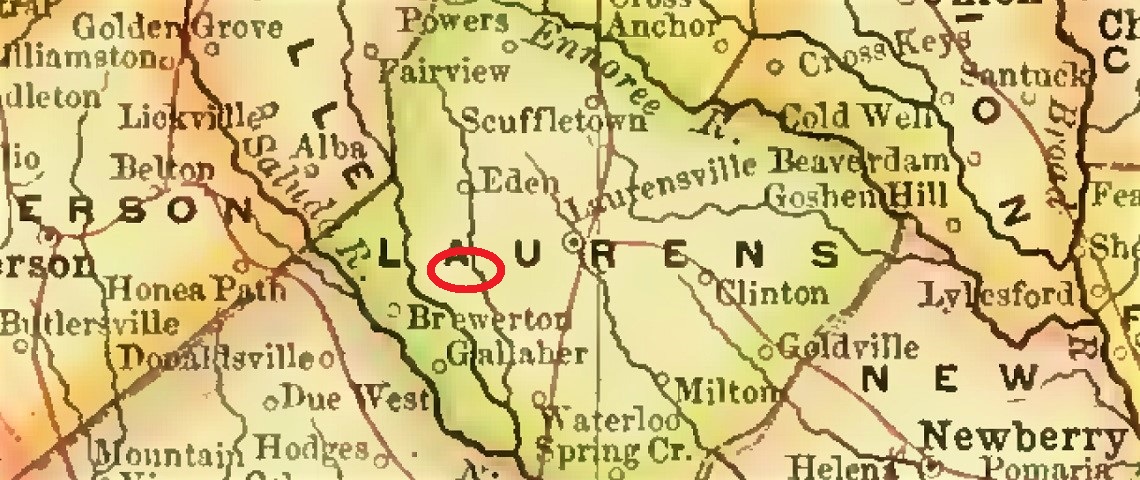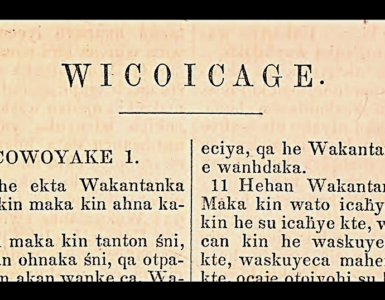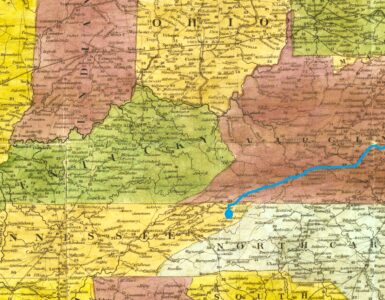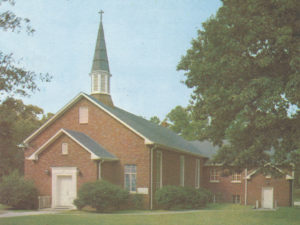 The area around Laurens, South Carolina where Friendship Church was organized in 1820 was settled beginning in the mid-eighteenth century by mostly Irish and Scotch-Irish immigrants and their descendants. George Howe believed that Friendship was the fifth Presbyterian church established in Laurens County. The first minister to supply the congregation’s pulpit was the Rev. Eleazer Kirkpatrick who began his term in 1823 and continued into 1826. He was followed by Eleazar Brainard for a term of two years, then Aaron Foster, 1828-1829, and the team of Archibald Craig and Arthur Mooney shared the pulpit beginning in 1829. Rev. William Quillan was an occasional supply in 1832. The shortage of ministers in South Carolina combined with extended distances between small rural churches led to short term calls or supplies.
The area around Laurens, South Carolina where Friendship Church was organized in 1820 was settled beginning in the mid-eighteenth century by mostly Irish and Scotch-Irish immigrants and their descendants. George Howe believed that Friendship was the fifth Presbyterian church established in Laurens County. The first minister to supply the congregation’s pulpit was the Rev. Eleazer Kirkpatrick who began his term in 1823 and continued into 1826. He was followed by Eleazar Brainard for a term of two years, then Aaron Foster, 1828-1829, and the team of Archibald Craig and Arthur Mooney shared the pulpit beginning in 1829. Rev. William Quillan was an occasional supply in 1832. The shortage of ministers in South Carolina combined with extended distances between small rural churches led to short term calls or supplies.
One way for an isolated church to have a regularly called minister was to grow one. A son of the congregation and the first minister to remain at the church more than a few years was Samuel B. Lewers. He had been a ruling elder on the session of Friendship but was then ordained to the ministry and became its minister beginning in 1832 while he also worked in establishing First Presbyterian Church in Laurens. It was not uncommon for ruling elders in South Carolina to supply churches and as in the case of Lewers, to then become licensed and in some cases ordained. There are advantages to having a minister from within a congregation, such as familiarity with the congregants, their expectations, and the community. But there is a flip side. These same factors could be problematic if a minister were too familiar with the flock, or he let congregants’ expectations direct his ministry, or his past reputation among the unchurched affected his work. Lewers continued until 1844 when after twelve years he resigned and dedicated his full-time effort to First Church, Laurens.
The next minister was a man of Scotch-Irish descent and a son of South Carolina. William was born to John and Elizabeth McWhorter in Oconee County, March 16, 1811. Generally, in the era a man seeking education stayed near home, but in William’s case he travelled to Jefferson College in Canonsburg, Pennsylvania. It was a dramatic change of culture, terrain, and climate. No reason is given for venturing more than five-hundred miles to attend college, but William found it difficult to adjust to the frigid, snow-burdened winters of the Pittsburgh area. Thus, concerns for his health brought him back to his more temperate homeland to complete studies in the University of Georgia. The year 1837 was eventful not only for McWhorter but also the Presbyterian Church in the United States of America (PCUSA). During the General Assembly of 1837 the denomination divided into the Old School and the New School (actually, the Old School ejected the New School). There are some exceptions, but South Carolina and its presbyteries were Old School with McWhorter continuing his ministry in the Old School South Carolina Presbytery. The important personal events for young McWhorter included marriage to Miss M. M. Kyle, July 18, and after private theological study with Rev. Dr. Barr of Abbeville County he was licensed by South Carolina Presbytery that fall. William and his recent bride travelled to the old southwest in Mississippi where he continued as a licentiate in Tombeckbee Presbytery, but all did not go well with him as he supplied pulpits.
Whereas we have evidence that Mr. R. Gilmer, a member of this Presbytery and Mr. Wm. McWhorter, a licentiate under our care, travelled without the bounds of the congregation on their return home on the Sabbath evening: Therefore, resolved that we disapprove of all such conduct; and that a copy of this resolution be sent to the Session of Providence church [in Pontotoc]. (Winter, 245fn38)
On the Sabbath, according to the presbytery’s disapproval, one should travel only the distance necessary for attendance of worship and ministers likewise should have ridden only so far as required for pulpit supply. Pastor Gilmer and his licensed colleague made a detour. McWhorter must have taken the rebuke well because the next year, he was ordained a home missionary by Chickasaw Presbytery. After three years he returned to South Carolina to supply churches in Laurens and Newberry Counties including an eight-year tenure with Friendship Church ending in 1851. He was also an instructor for Erskine College, 1843-1850. For the remainder of his years as a preacher, 1852-1883, he supplied Nazareth Church near Spartanburg as well as churches in Pickens, Bethel, Richland (between Westminster and Seneca), and Retreat. He died at his home in Oconee County, February 9, 1884, after a brief illness. The short death notice in The Anderson Intelligencer, February 21, 1884, commented that he was “an aged and highly esteemed minister” and his friends would “regret to hear of his death.” Upon Rev. McWhorter’s gravestone is inscribed, “My heart is fixed trusting in the Lord.”
Following Rev. McWhorter’s more than thirty years of preaching, the Friendship Church was faced with seeking a minister for supply or a regular call. One supply was Licentiate David Wills who for a year after graduating Columbia Theological Seminary tested his ministry gifts at Friendship before going on to ordination and installation in the Lawrenceville Church in Georgia in 1851. The next supply had several years of experience including pastoring the Nazareth Church and his name is Zelotes L. Holmes. He had recently resigned the Nazareth call and moved to Laurens, and he supplied Friendship intermittently until 1855, possibly even 1860 when for about two years President Edward T. Buist of Laurens Female College supplied the church. When Buist left the area to accept a call to the Washington Street Church in Greenville (currently First Presbyterian), Friendship entered an extended period of intermittent occasional and short-term supplies which included J. L. Kennedy in 1861, F. W. Farrow in 1865, and from 1869 to 1909 there were an additional fourteen pastors and/or supplies. Every congregation hopes to have a minister specifically dedicated to its care, but the reality of the expansive fields of agriculture, low population density, and limited availability of ministers meant stated supplies who were willing to hitch up the horses and ride to scattered churches were a way of life.
Friendship Presbyterian Church celebrated its centennial in 1920. Services were held each day in the beautiful church by the Pastor Robert P. Walker of Lewisburg, Tennessee. Others involved in the celebration included Ross Lynn of Thornwell Orphanage in Clinton, and R. G. Matheson of the Fairview Church in Fountain Inn. James Maxwell Dallas, who had been a pastor in the Presbyterian Church of Canada and the PCUSA before entering the Presbyterian Church in the United States (PCUS) was the minister at the time having served the church for eleven years. Rev. Dallas must have been delighted to have his son Archibald, who was pastor of the First Presbyterian church of Mount Vernon, Indiana, participate in the centennial. During the week of festivities two grand picnics were held on the church grounds that were attended by people from the region and some former members came from considerable distances. In preparation for the next one hundred years of ministry the church building was renovated and improved at a cost of $2,500. In 1920, the church had one hundred and sixteen members, which was the largest membership it had ever known.
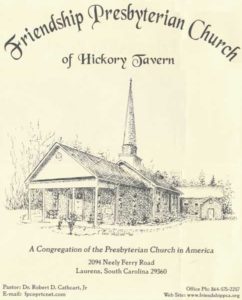 As the years passed, the Friendship flock, instead of waiting for the bicentennial in 2020 celebrated its one-hundred-ninetieth anniversary. The Laurens Advertiser of October 9 reported on the festivities. On Sunday, September 26, over 170 people met for the celebration that included a multi-media presentation during the Sunday School hour followed by a worship service in which the present pastor, Dr. Robert D. Cathcart, Jr., delivered a sermon titled, “Family Privileges,” from 1 Timothy 3:14-16. Following worship, the hungry celebrants met in the fellowship hall for what the Advertiser described as “an enormous feast,” and the journalist believed that without “question, Friendship Presbyterian Church has enjoyed a rich history.”
As the years passed, the Friendship flock, instead of waiting for the bicentennial in 2020 celebrated its one-hundred-ninetieth anniversary. The Laurens Advertiser of October 9 reported on the festivities. On Sunday, September 26, over 170 people met for the celebration that included a multi-media presentation during the Sunday School hour followed by a worship service in which the present pastor, Dr. Robert D. Cathcart, Jr., delivered a sermon titled, “Family Privileges,” from 1 Timothy 3:14-16. Following worship, the hungry celebrants met in the fellowship hall for what the Advertiser described as “an enormous feast,” and the journalist believed that without “question, Friendship Presbyterian Church has enjoyed a rich history.”
Information about the history of the church buildings was not located in the published sources other than mention by George Howe of a building used by Friendships and shared with the Methodists and Baptists. It was not uncommon for denominations in small towns to share a building. The current building is pictured on the bulletin cover for the 190th anniversary and the color image is from late 1973. Comparing the two images will show the addition of a white portico to the brick building sometime between 1973 and 2010. The cemetery is in front of the building and it is delimited by the two access driveways for the church and parking lot.
Barry Waugh
Sources—In the header Friendship Church is about ten miles west of Laurensville (currently, Laurens) and just south of Hickory Tavern (not shown on the map). The red ellipse provides the approximate location. The information on the church centennial was found in a copy of The Laurens Advertiser, Aug. 11, 1920, as found in the digital collection of the Library of Congress, http://chroniclingamerica.loc.gov; the Oct. 9, 2010, article regarding Friendship’s 190th anniversary was found on The Laurens Advertiser website in the archives where recent copies of pages and issues may be accessed; F. D. Jones and W. H. Mills, History of the Presbyterian Church in South Carolina Since 1850, Columbia: Synod of South Carolina, 1926, pp. 1000-1002; and George Howe, History of the Presbyterian Church in South Carolina, 2 vols., Columbia: Duffie & Chapman, 1870; Columbia: W. J. Duffie, 1883, 2:377, 535, 710. The grave marker inscription text for Rev. McWhorter was found on the Find-a-Grave website. The reference to Winter is, Robert Milton Winter Outposts of Zion: A History of Mississippi Presbyterians in the Nineteenth Century, published by the author, 2014, Winter has more about Sabbath practices in Mississippi as does E. T. Thompson, Presbyterians in the South, vol. 1; Scott’s Ministerial Directory, says McWhorter was ordained in Chickasaw Presbytery in Mississippi but Winter’s account from the Tombeckbee Minutes says he was one of its licentiates. The images of the bulletin cover and the church building were provided courtesy of the P.C.A. Historical Center, St. Louis, Missouri, Wayne Sparkman, Director.


